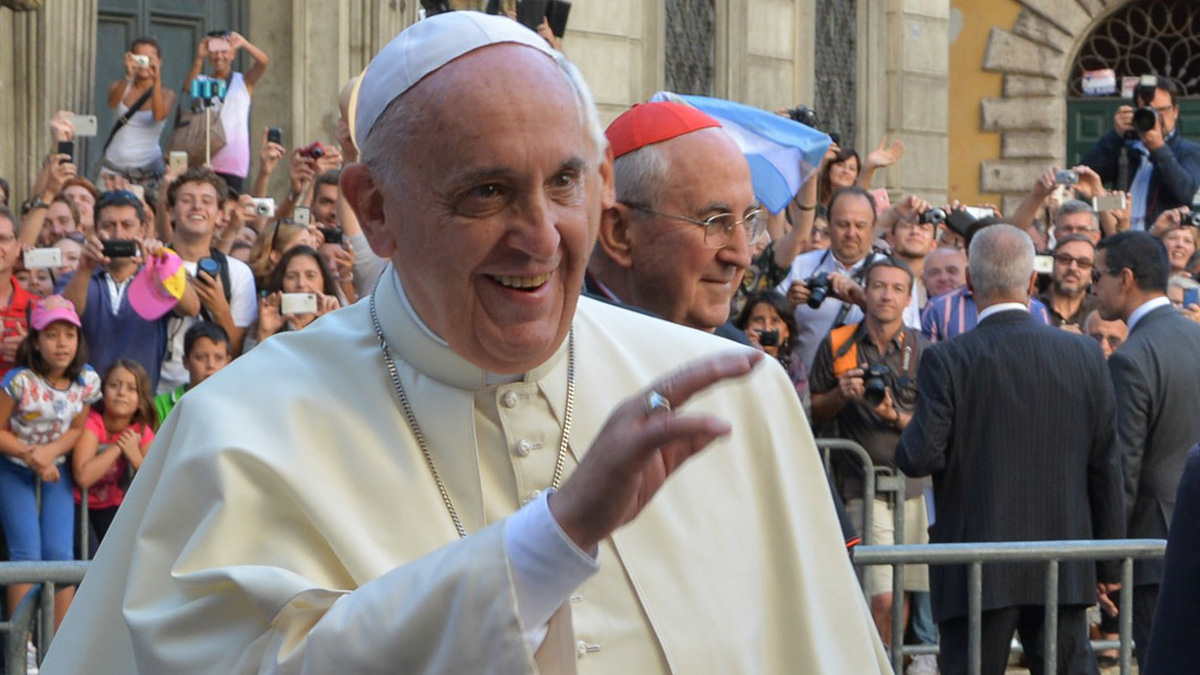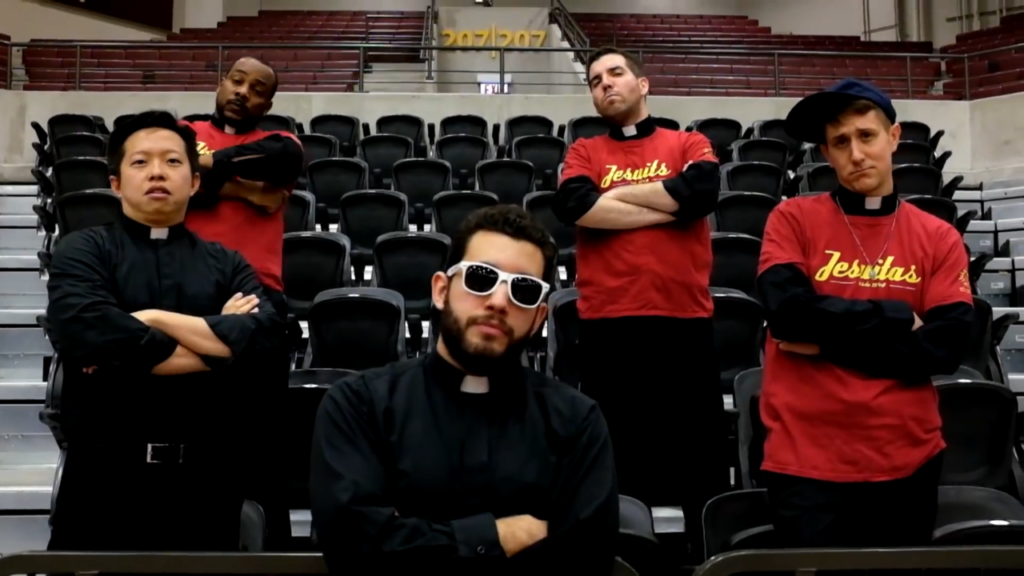Pope Francis And Jesuits: The Spiritual Bond That Shapes Modern Catholicism
When it comes to understanding Pope Francis and his connection to the Jesuits, we're diving into a fascinating world of faith, history, and leadership. The Pope, a member of the Society of Jesus, has made significant waves in the Catholic Church since his election in 2013. His approach to leadership and his commitment to social justice reflect the core values of the Jesuits. This makes Pope Francis not just a religious leader but also a symbol of change in the modern world.
You might be wondering, why does this matter? Well, Pope Francis is more than just the head of the Catholic Church. He's a reformer, a voice for the marginalized, and a man deeply rooted in Jesuit traditions. His influence extends beyond religious boundaries, reaching into global discussions on poverty, climate change, and social inequality. His journey as a Jesuit priest offers valuable insights into how spirituality can inspire real-world action.
Throughout this article, we'll explore the intricate relationship between Pope Francis and the Jesuits. We'll delve into his background, the principles that guide his leadership, and how these principles impact the global Catholic community. So, whether you're a devout Catholic or simply someone interested in the intersection of faith and leadership, this article will provide a comprehensive look at one of the most influential figures of our time.
Read also:Wyandotte Boat Ramp Your Ultimate Guide To Navigating The Waterways
Who Are the Jesuits?
To truly grasp the significance of Pope Francis's connection to the Jesuits, we need to first understand who the Jesuits are. The Society of Jesus, commonly known as the Jesuits, is a religious order within the Catholic Church. Founded in 1540 by Ignatius of Loyola, the Jesuits are renowned for their commitment to education, missionary work, and social justice.
One of the key aspects of the Jesuits is their focus on intellectual rigor and spiritual discipline. Members undergo extensive training, often taking over a decade to complete their formation. This dedication to learning and service has positioned the Jesuits as a powerful force within the Catholic Church.
Interestingly, the Jesuits have a reputation for being adaptable and open-minded. They embrace diverse cultures and contexts, which has allowed them to thrive in various parts of the world. This flexibility is something Pope Francis embodies, making him a natural leader for the modern Church.
The Origins of the Jesuits
The story of the Jesuits begins with Ignatius of Loyola, a former soldier who experienced a profound spiritual conversion. His vision was to create a group of men dedicated to serving God through education and missionary work. This vision took shape in the form of the Spiritual Exercises, a series of meditations and prayers designed to deepen one's relationship with God.
Today, the Spiritual Exercises remain a cornerstone of Jesuit spirituality. They encourage individuals to reflect on their lives, make informed decisions, and discern God's will. For Pope Francis, these exercises have been a guiding force throughout his life and ministry.
Pope Francis: A Jesuit at Heart
Pope Francis, born Jorge Mario Bergoglio, is the first Jesuit to ever become Pope. This fact alone is significant, as it marks a shift in the leadership of the Catholic Church. His background as a Jesuit priest has greatly influenced his papacy, shaping his approach to governance and social issues.
Read also:Pitbull Puppies For Sale In Wisconsin A Comprehensive Guide To Finding Your Perfect Companion
Before becoming Pope, Bergoglio served as the Archbishop of Buenos Aires. During his tenure, he was known for his humility, often taking public transportation and living in a simple apartment. These traits reflect the Jesuit emphasis on simplicity and service.
In 2013, he was elected Pope, taking the name Francis in honor of St. Francis of Assisi. This choice was symbolic, highlighting his commitment to poverty, humility, and care for the environment. As Pope, Francis continues to champion these values, making them central to his message and mission.
Biography of Pope Francis
| Full Name | Jorge Mario Bergoglio |
|---|---|
| Date of Birth | December 17, 1936 |
| Place of Birth | Buenos Aires, Argentina |
| Ordained Priest | December 13, 1969 |
| Elected Pope | March 13, 2013 |
The Jesuit Influence on Pope Francis
The Jesuit influence on Pope Francis is evident in many aspects of his papacy. From his emphasis on social justice to his approach to ecumenical dialogue, the principles of the Jesuits guide his actions and decisions.
One of the key tenets of Jesuit spirituality is the idea of "finding God in all things." This belief encourages individuals to see the divine in everyday life, fostering a sense of gratitude and wonder. Pope Francis frequently speaks about this concept, urging Catholics to engage with the world in a meaningful way.
Additionally, the Jesuits stress the importance of education and intellectual formation. Pope Francis has championed these values, advocating for access to quality education for all. His commitment to education reflects his belief that knowledge can be a powerful tool for transformation and empowerment.
Key Principles of Jesuit Spirituality
- Finding God in all things
- Commitment to social justice
- Intellectual rigor and education
- Adaptability and openness
Pope Francis and Social Justice
Social justice is a central theme in Pope Francis's teachings. Drawing on Jesuit traditions, he advocates for a Church that is "going out" to meet the needs of the poor and marginalized. His messages often focus on issues such as poverty, inequality, and environmental degradation.
In his encyclical "Laudato Si'," Pope Francis addresses the urgent need for environmental protection. He calls on individuals and nations to take action against climate change, emphasizing the interconnectedness of all creation. This encyclical reflects the Jesuit commitment to caring for the earth and its inhabitants.
Beyond environmental concerns, Pope Francis is also a vocal advocate for migrants and refugees. He has repeatedly called for greater compassion and solidarity, urging societies to welcome those in need. His stance on these issues has earned him both praise and criticism, but it underscores his dedication to justice and compassion.
Encyclical "Laudato Si"
"Laudato Si" is a landmark document in the Catholic Church, addressing ecological concerns and their impact on human life. It calls for a holistic approach to environmental stewardship, recognizing the link between ecological and social issues. Pope Francis's emphasis on sustainability and justice in this encyclical resonates deeply with Jesuit values.
Pope Francis and Ecumenical Dialogue
Another area where Pope Francis's Jesuit background is evident is in his approach to ecumenical dialogue. The Jesuits have long been involved in interfaith and interdenominational discussions, seeking to build bridges between different religious communities.
Pope Francis has continued this tradition, engaging in dialogue with leaders from various Christian denominations and other faiths. His openness and willingness to listen have helped foster greater understanding and cooperation among diverse groups. This approach reflects the Jesuit emphasis on unity and reconciliation.
One notable example of Pope Francis's ecumenical efforts is his work with the Orthodox Church. He has met with Orthodox leaders on numerous occasions, seeking to strengthen ties between the Catholic and Orthodox traditions. These efforts demonstrate his commitment to promoting unity within Christianity.
Dialogue with Other Faiths
Pope Francis has also engaged in dialogue with leaders from other faiths, including Islam and Judaism. His interactions with these communities highlight his belief in the importance of mutual respect and understanding. By fostering relationships across religious boundaries, Pope Francis embodies the Jesuit ideal of promoting peace and harmony.
Pope Francis's Leadership Style
Pope Francis's leadership style is deeply rooted in Jesuit principles. He is known for his humility, accessibility, and willingness to challenge the status quo. These traits have made him a beloved figure among Catholics and non-Catholics alike.
One of the hallmarks of Pope Francis's leadership is his emphasis on mercy and compassion. He frequently reminds Catholics of the importance of forgiving others and showing kindness, even to those who may seem unworthy. This focus on mercy reflects the Jesuit belief in the transformative power of grace.
Furthermore, Pope Francis is not afraid to tackle controversial issues head-on. Whether it's addressing clergy sexual abuse or reforming the Vatican bureaucracy, he approaches challenges with courage and determination. His boldness in confronting difficult issues has earned him respect and admiration from many quarters.
Challenges Faced by Pope Francis
Of course, Pope Francis's leadership has not been without its challenges. Some within the Church have criticized his reforms, viewing them as too radical or progressive. Others have questioned his handling of certain issues, such as the clergy abuse crisis.
Despite these challenges, Pope Francis remains steadfast in his mission to transform the Catholic Church. He continues to push for change, encouraging Catholics to embrace a more inclusive and compassionate vision of faith.
The Future of the Catholic Church
Looking ahead, the influence of Pope Francis and the Jesuits on the Catholic Church is likely to continue. Their emphasis on social justice, education, and ecumenical dialogue offers a roadmap for addressing the challenges facing the Church today.
As the Church navigates issues such as declining membership, clergy abuse, and changing societal values, the principles of the Jesuits can provide guidance and inspiration. Pope Francis's leadership serves as a model for how faith can be lived out in a rapidly changing world.
In the years to come, the Catholic Church will need to adapt and evolve to remain relevant. By drawing on the wisdom and traditions of the Jesuits, it can continue to make a positive impact on the lives of its members and the broader global community.
Conclusion and Call to Action
To sum up, Pope Francis and the Jesuits have had a profound impact on the Catholic Church and the world at large. Their commitment to social justice, education, and ecumenical dialogue offers a vision of faith that is both grounded in tradition and responsive to contemporary challenges.
As you've read through this article, I hope you've gained a deeper understanding of the relationship between Pope Francis and the Jesuits. Now, I invite you to take action by sharing your thoughts in the comments below. What resonates with you about Pope Francis's leadership? How do you see the principles of the Jesuits influencing the future of the Church?
For more insights into the intersection of faith and leadership, be sure to explore other articles on our site. Together, let's continue the conversation and work towards a more just and compassionate world.
Table of Contents
- Who Are the Jesuits?
- The Origins of the Jesuits
- Pope Francis: A Jesuit at Heart
- Biography of Pope Francis
- The Jesuit Influence on Pope Francis
- Key Principles of Jesuit Spirituality
- Pope Francis and Social Justice
- Encyclical "Laudato Si"
- Pope Francis and Ecumenical Dialogue
- Dialogue with Other Faiths
- Pope Francis's Leadership Style
- Challenges Faced by Pope Francis
- The Future of the Catholic Church
- Conclusion and Call to Action


